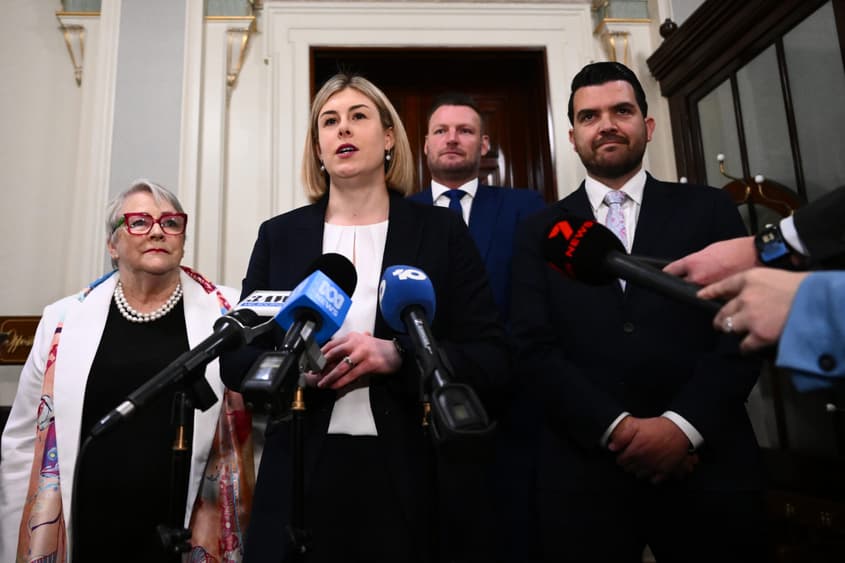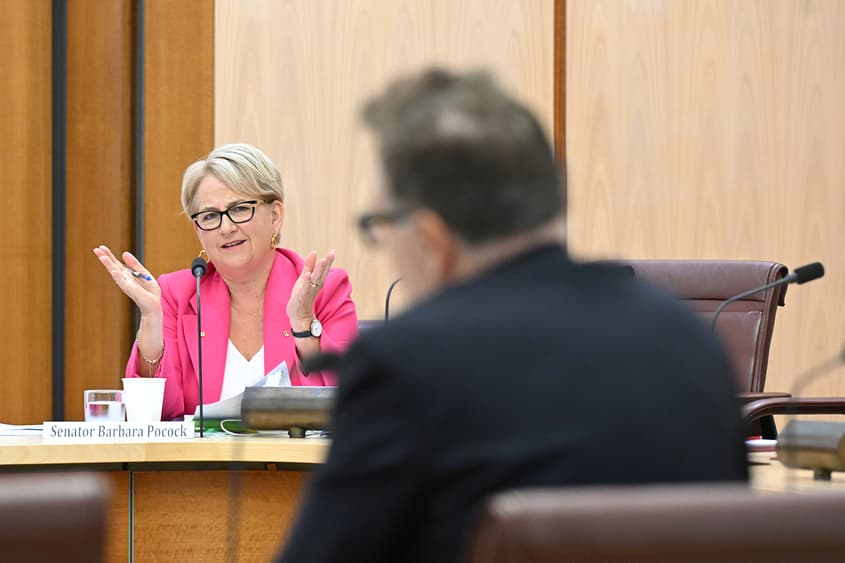With Victoria on its third Oppostion Leader in a year, and speculation about pressure on the Federal and NSW Liberals, we're left wondering: what makes an Opposition Government?
Tue 18 Nov 2025 22.00

Incoming Victorian Opposition Leader Jess Wilson | Photo: AAP Image/Joel Carrett
This week, the Victorian Liberal Party changed party leaders, swapping Brad Battin for first-term MP Jess Wilson – making her the state’s third Opposition Leader in a year. Liberals elsewhere are also restless, with both NSW Opposition Leader Mark Speakman and federal Opposition Leader Sussan Ley reportedly under pressure.
But why are some parties given the special status of “His Majesty’s Opposition”, and why is Opposition Leader such an apparently coveted position?
The Opposition is a feature of Westminster democracy that Australia inherited from the United Kingdom. The Opposition is the largest party or coalition other than those currently in government, ready to step in if the government of the day loses the confidence of the Parliament or is voted out in an election.
The position of Leader of the Opposition and the privileges of the Opposition are based partly on convention and partly on laws and rules. For example, Ms Ley’s salary is determined by legislation, but her speaking privileges come from the standing orders. Her rank in the order of precedence is set by regulation.
Prime Minister Anthony Albanese decides how many staff Ms Ley gets. Yes, how many resources the Opposition Leader receives is decided by the man whose job she threatens. Earlier this year, Mr Albanese cut Opposition staff allocations, making it harder to challenge him.
The prestige and resources still make official Opposition status a coveted prize – but changing voter behaviour and political strategies have made the idea of a single Opposition unhelpful.
Multiple parties can legitimately claim to be “the” Opposition.
By convention, the Opposition is whichever party or coalition has the most seats in the lower house, regardless of whether they are the group best placed to replace the government.
In Western Australia, the dominance of one political party means “the Opposition” has lost meaning. In 2021, state Labor won an overwhelming majority: 53 lower house seats to the Nationals’ 4 and Liberals’ 2. In WA, the Liberals do not sit in Coalition with the Nationals.
Majority in the lower house wins, making the Nationals the official Opposition even though the Liberals won more votes, had more seats in the upper house, and indeed more seats overall in Parliament.
In 2025, the situation in Western Australia risked becoming more ridiculous. The Nationals and Liberals looked like they would win the same number of lower house seats: 6 each. The Nationals would have remained the Opposition only by virtue of incumbency. Ultimately, the Liberals won 7 seats and broke the tie – although it would be a remarkable reversal of fortune if they defeated the government any time soon.
Western Australia has had two different parties of opposition in the last two terms, with neither’s claim much stronger than the other’s.
The main source of opposition is not always “the Opposition”.
There is remarkable agreement between the major parties in Tasmania. Both the Liberal Government and Labor Opposition support legislation to build a $1.1 billion AFL stadium in Hobart. Anywhere else in the country, that would be enough to make it law. But the state’s unique upper house, the Legislative Council, is majority independent. Even when Government and Opposition vote together, they need to convince a couple of independents to get legislation passed.
Who is the “real” Opposition in these circumstances? The Labor MPs who voted for the government’s plan, or the independents and Greens who oppose it?
The ambiguity is not limited to the upper house. Earlier this year, the lower house saw independent and Green motions of no confidence in the Liberal Government. The votes of the Labor Opposition kept the Liberal Government in power. Labor did eventually join a no-confidence vote and toppled the Liberals, but even then proved unwilling to actually replace them.
By contrast, the Greens and at least some of Tasmania’s many independents seem prepared to form government if given the opportunity. Ruth Forrest, an independent from the upper house, helpfully pointed out that in the 1800s Tasmanian Premiers were often independents from the upper house. The Greens have made no secret of their ambitions since Bob Brown expanded on the Democrats’ slogan: “We are not there to keep the bastards honest, we are there to replace them”.
Tasmanians have an alternative government that is shy of governing, and a crossbench prepared to take its place.
The alternative government does not always have a path to government
The three trends – Labor domination, more crossbenchers and Liberal/National division – came to a head in federal politics after this year’s election. When the Nationals (briefly) quit the Coalition, the Liberals were left with no more lower house seats than the crossbench (Nationals, Greens, independents and minor parties).
Independent Andrew Wilkie provocatively suggested: “The crossbench could become the Opposition, and a crossbencher the Opposition Leader”.
As a matter of parliamentary convention, that would be blocked.
But how the public and the media talk and behave is another matter.
If a so-called Opposition passes up the opportunity to govern, if it agrees with the Government on major election issues or if it has no serious path to government, should it be called the alternative government?
Australians need new language to describe the distribution of power in multi-party democracies: where there are sometimes many oppositions, and sometimes none.
